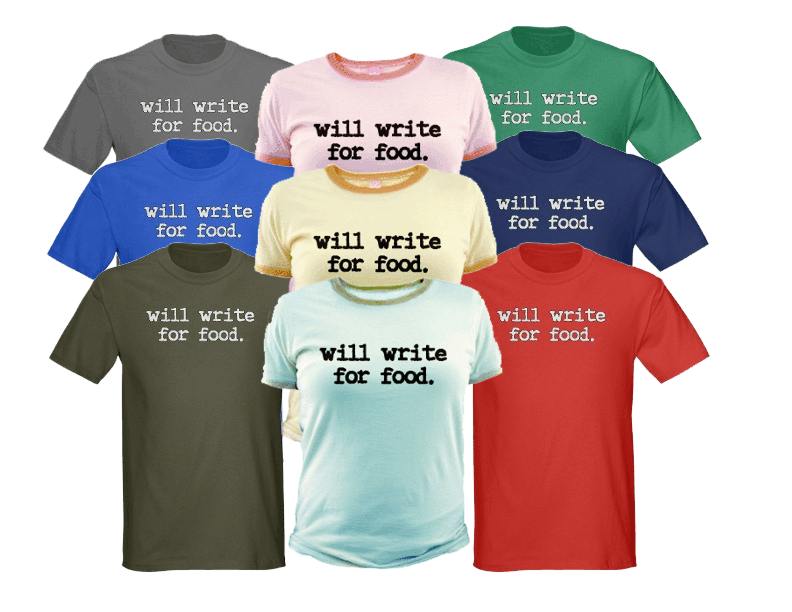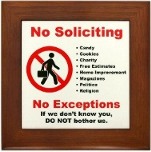Buy Will Write for Food T-shirts

Many more styles and colors
available
also mugs, mouse pads, stickers, buttons, etc.
Click
here to see the entire collection
Do you want to write the great American novel? Well, first you have to spend
months, if not years, writing it, then you have to find an agent, then you have to find a publisher, then you
try to get an advance, then you have to wait a long time until it's published, then you have to wait for it to
start selling, then you have to wait for the royalty period to end, and
then a few months after that you might receive your first royalty
check.
"Will Write for Food"
neatly sums up the desire of most writers. You'll never get rich, but if
you have a little talent, you work hard, and you're lucky, you might be
able to earn a living as a writer.
Why wear a T-shirt that says Will Write for Food?
Because it pays to advertise. It takes a healthy ego to be
a writer so there's no reason to be bashful about advertising your
services.
Five reasons why I prefer to earn my living as a writer:
1. I'm not at the mercy of any single employer.
I hate the idea of putting my future in the hands of any one company or employer. Having a
job has its advantages. But that job can disappear at any time, either through changes in
the economy, or through mismanagement. Considering the high failure rates
of US companies, I'd rather be at the mercy of my own incompetence.
2. I can work anywhere.
I'm sitting at my desk in my home office right now. But I could be on the
couch, in bed, or on a plane, in a hotel, at the beach, in a bar --
anywhere, really. The important thing is that I'm not watching the clock
in a cubicle somewhere. Most of the time I can be wherever I want.
3. I work when I want.
Having the freedom to pick my own working hours is great, but admittedly
that freedom can sometimes be the freedom to work twelve hours a day,
seven days a week. But on the plus side, I don't waste a lot of time
sitting in traffic. And if there is a lull in my work, I can take some time
off without asking anyone's permission.
4. I'm always learning something new.
As a freelance writer I can write on whatever subject interests me. If I
can't get someone else to publish it, I can always publish it myself on
one of my web sites.
5. I'm earning a living.
That's the point. Could I earn this much as an employee somewhere? Maybe,
but I doubt it. Being a freelance writer has paid off for me financially
and by improving the quality of my life.
George Orwell in the essay Why I
Write said, "Putting aside the need to earn a living, I think there are four great motives for writing, at any rate for writing prose. They exist in different degrees in every writer, and in any one writer the proportions will vary from time to time, according to the atmosphere in which he is living. They are:"
Sheer
egoism -- Desire to seem clever, to be talked about, to be remembered after death, to get your own back on the grown-ups who snubbed you in childhood, etc., etc. It is humbug to pretend this is not a motive, and a strong one. Writers share this characteristic with scientists, artists, politicians, lawyers, soldiers, successful businessmen -- in short, with the whole top crust of humanity. The great mass of human beings are not acutely selfish. After the age of about thirty they almost abandon the sense of being individuals at all -- and live chiefly for others, or are simply smothered under drudgery. But there is also the minority of gifted, willful people who are determined to live their own lives to the end, and writers belong in this class. Serious writers, I should say, are on the whole more vain and self-centered than journalists, though less interested in money .
Aesthetic
enthusiasm -- Perception of beauty in the external world, or, on the other hand, in words and their right arrangement. Pleasure in the impact of one sound on another, in the firmness of good prose or the rhythm of a good story. Desire to share an experience which one feels is valuable and ought not to be missed. The aesthetic motive is very feeble in a lot of writers, but even a pamphleteer or writer of textbooks will have pet words and phrases which appeal to him for non-utilitarian reasons; or he may feel strongly about typography, width of margins, etc. Above the level of a railway guide, no book is quite free from aesthetic considerations.
Historical
impulse -- Desire to see things as they are, to find out true facts and store them up for the use of posterity.
Political
purpose -- using the word "political" in the widest possible sense. Desire to push the world in a certain direction, to alter other peoples' idea of the kind of society that they should strive after. Once again, no book is genuinely free from political bias. The opinion that art should have nothing to do with politics is itself a political attitude.
|
|

